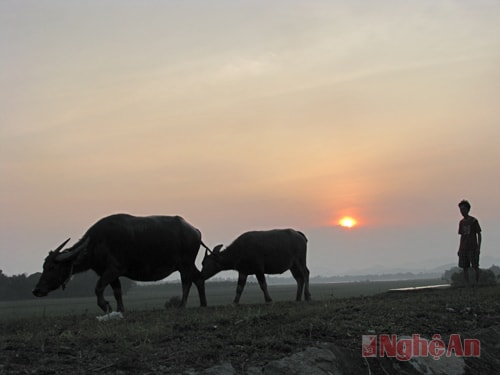Choked with "Song of the River"
(Baonghean) -I remember about 7 years ago, when I went back to my hometown, I often saw my father turn on the disc of singer Anh Tho, listening to the song “Khuc hat song que” over and over again the most. At that time, I was still passionate about another type of music, and I asked myself what made my father love that song so much. Then, to find the answer, I immersed myself in the melody and the lyrics…
“After more than half a life of wandering, I return to bury my face in my hometown river. Oh, the river is as vast as a mother’s heart, protecting me through lightning, seas, and rain…” From beginning to end, “The Song of the Hometown River” by musician Nguyen Trong Tao carries a poignant melody. From the lyrics to the melody, everything is imbued with sadness and love, forming a gentle, profound flow that slowly penetrates the listener’s consciousness.
Nguyen Trong Tao was born in Dien Chau (Nghe An), is a poet, journalist, painter and above all, to the majority of his fans, he is a talented musician. He did not compose many songs, but many of his works won awards from the Vietnam Musicians Association such as: "The Sun in the City" (1983), "The Road to Thach Nham" (1984), "The Sad Cricket" (1997), "Dong Loc Thong Ru" (1998), "The Song of the Homeland River" (2005). But above all the awards, "The Song of the Homeland River" is known to all those interested in music and many people, from famous singers to rustic farmers, have hummed it many times.
 |
| Sunset. Photo: Thuy Vinh |
Set to music from the poem of the same name by Le Huy Mau, “The Song of the Homeland” has become a spiritual gift for many music lovers. Perhaps, the two sons of Nghe An have found a common ground and then, as if it could not be otherwise, as if it could not be more harmonious and perfect, the song was born and anchored in the hearts of listeners, making them moved with emotion.
Le Huy Mau's poem is quite long, rich in emotions, elegant in meaning, simple but moving in language, free verse with short and long sentences following each other softly..., all of these things have structured a rhythmic melody for the poem. On his part, musician Nguyen Trong Tao has chosen the most refined and haunting words to create the lyrics for the song. These are images that easily touch people's hearts, easily make people cry - those who have been far away from home, who have sobbed every time they return: "Does the river still remember the place where I sat waiting for my mother, the distant childhood of a penny of sesame rice paper... The fish in the river, the plants grown on the banks, the harvested rice still leaving fragrant straw. On the same riverbank, the buffaloes swam in the waves below, the children bathed in the cool water upstream...".
People hummed Nguyen Trong Tao's melody as if they were on a pilgrimage back to their roots. Something choked up in their throats, something aching in their hearts. Music has penetrated into every corner of people's emotions, to become their memories and breath. Is it true, who among us has not had such a childhood to remember: a river flowing passionately with dreams of paper boats, dreams of struggling? The longing for mother to return with the joy of bursting into her hands with a gift from the district market? The fragrant smell of straw rustling from the fields, the figure of mother, the figure of grandmother? The buffalos slowly walking back in the plum-colored sunset?
Not simply recalling images, recalling memories, song lyrics but originating from the poetic lines of Le Huy Mau, much more profound, much more affectionate when just a few words have expressed the qualities of a homeland: harvested rice still leaves fragrant straw..., on the same riverbank, buffaloes swam in the waves below/ children bathed in the cool water upstream. And then, that cool, clear stream will forever be the cool, refreshing stream that cleanses people of their barrenness, worries, pains, and dust. Is the river or is it the mother's heart that caresses, the mother's heart that cherishes, the mother's heart that opens to welcome?
| RELATED NEWS |
|---|
My father was also an expatriate, he spent most of his life living in places convenient for work and family. Now I understand why he kept listening to that song over and over again. Perhaps, he found something close to his heart, like a wave finding a stream to join the rhythm, like a river silently flowing into the sea and then melting into that vastness in a joy.
Quynh Lam






